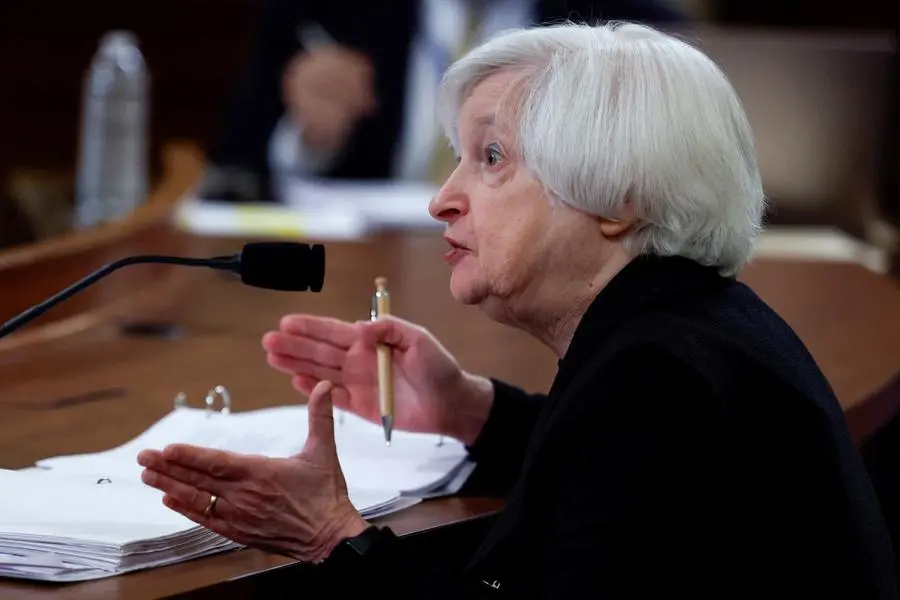PHOTO
Treasury Secretary Janet Yellen lands at Japan's G7 finance meeting this week, with her ambitious economic agenda hijacked by a bitter partisan fight over the U.S. debt ceiling that threatens a new financial crisis, and a signature tax deal blocked by Republicans.
Yellen spent last year spearheading punishing G7-led sanctions imposed on Russia over its invasion of Ukraine. She's likely to spend much of the two-day meeting in Niigata reassuring the same group that the U.S. is not going to tank the global economy with a payments default.
The shift illustrates how profoundly U.S. partisan divides can reverberate around the globe and stall the Biden administration's multilateral economic goals.
"Yellen has got a tough brief for the G7. Having to deal with the debt ceiling puts egg on the face of the U.S. as an economy globally," said Harry Broadman, a former White House, World Bank and U.S. trade official, adding that it distracts from other initiatives.
Republicans' control of the House of Representatives since January has made it more difficult for Yellen to deliver on promises Democrats made in multilateral negotiations, such as U.S. participation in the 15% global minimum corporate tax, for which she won support in 2021.
"Governing in the U.S. now on economic matters is as about as tough as I've seen it because there is such intransigence, particularly on the Republican side," added Broadman, managing director at Berkeley Research Group.
Republican House of Representatives Speaker Kevin McCarthy argued ahead of a high-stakes meeting on Tuesday with President Joe Biden that some spending concessions on the debt limit were necessary to bring a spiraling U.S. deficit under control, and Biden "has got to stop ignoring problems." Yellen, who did not attend the meeting, will use a news conference in Japan on Thursday to speak about the risks of a U.S. debt default, which the Treasury said could come as soon as June 1. She will warn about "the global impact of this standoff and highlight the need to avoid default," a senior Treasury official said.
The U.S. bond market is the foundation for the global financial system, with the dollar as the reserve currency and Treasury debt long regarded as the world's safest and most liquid financial asset -- a status Yellen said would be eroded in a default.
Making matters worse, she also will need to reassure G7 finance ministers and central bank governors that pressures on U.S. regional lenders won't spin out of control after a third major bank failure.
Yellen delayed her trip to Japan to personally call U.S. business executives and appear on several major television shows to warn U.S. lawmakers that failure to raise the $31.4 trillion borrowing cap would be a "catastrophe" for global financial markets and the economy.
PUBLIC WARNINGS, PRIVATE ASSURANCES?
Martin Muehleisen, a former International Monetary Fund senior official, said he believes Yellen will be careful in private meetings with G7 counterparts not to suggest that a default is likely or even possible, given the panic that might cause.
"All hell will break loose on the day they stop paying their bills. It will lead to a freeze in global financial markets," said Muehleisen, now a fellow with the Atlantic Council.
He said he thinks Yellen would likely discuss potential contingency plans, including invoking the 14th Amendment, which says the validity of U.S. debt "shall not be questioned" to override Congress -- an option that Yellen has said is far from ideal.
TAX DEAL, SOVEREIGN DEBT
The potential debt default and U.S. banking woes are likely to overshadow urgent discussions about a looming sovereign debt crisis and could eclipse Japan's focus on reducing supply chain dependencies on China, experts said.
G7 counterparts will question Yellen "about the financial stability risks in the U.S., the regional banks' exposure to commercial real estate. Real risks that are not manufactured for political posturing," said Stephanie Segal, a former U.S. Treasury official who is a senior fellow at the Center for Strategic and International Studies in Washington.
Republicans in Congress, along with Democratic Senator Joe Manchin, have blocked U.S. ratification of the 15% global corporate minimum tax agreed by 137 countries, but other nations are implementing it. The divide potentially exposes U.S. companies to "top-up" taxes by foreign governments as the overseas rate is lower than 10%
The split also means that any plans for a unified war against inequality, a long-time Yellen goal, are shelved.
The far more complicated "Pillar 1" plan to allow countries to tax global technology giants and other highly profitable corporations on their local sales is still under negotiation.
Yellen is likely to argue for extending a moratorium on digital services taxes at the end of 2023, said Danielle Rolfes, a former U.S. Treasury official who heads KPMG's Washington national tax practice.
"I do think they are negotiating in good faith, I think they need more time," Rolfes said.
But she said that any Pillar 1 deal would likely need a two-thirds Senate majority treaty vote, which looks impossible at the moment, and "there is no Pillar 1 without the U.S."
The best hope for any movement in Congress on global tax issues comes in 2025, when lawmakers will be forced to revamp the entire U.S. tax code due to expiring individual tax cuts approved in 2017. (Reporting by David Lawder and Andrea Shalal; Editing by Heather Timmons and Jonathan Oatis)





















